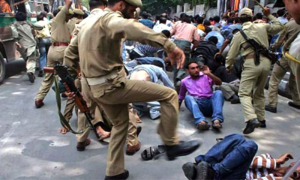MUMBAI: In the lead-up to India’s general elections starting on April 19, the country’s young, educated population faces a daunting challenge: despite being the fastest-growing major economy globally, India is grappling with a severe shortage of white-collar job opportunities for its graduates.
Mahesh Bhopale, a 27-year-old biology graduate from Mumbai, represents the aspirations and frustrations of millions of educated youths in India. Dreaming of securing a stable government job for financial security, Bhopale has juggled part-time roles, including assisting a tailor and working as a nighttime security guard, while preparing for demanding civil service exams.
For many like Bhopale, government employment offers stability, attractive benefits, and a pathway to marriage and family life, particularly for those lacking the social networks required to navigate the private sector.
According to the International Labour Organization, the unemployment rate among India’s young university graduates was 29 percent in 2022, significantly higher than those without degrees who often settle for low-paying service or construction jobs.
Development economist R. Ramakumar highlights the mismatch between job creation and India’s expanding young workforce, pointing out that a substantial portion of new jobs are in agriculture. This disparity fuels the overwhelming competition for limited government positions and motivates some to seek opportunities abroad, often through illicit means.
While Prime Minister Narendra Modi has touted attracting global tech giants to India, critics argue that this has not translated into the mass manufacturing employment sought by many. The World Bank warns that India, like its South Asian neighbors, is failing to create sufficient jobs to accommodate its growing working-age population.
The intense competition for government jobs is evident, with Indian Railways receiving millions of applications for a relatively small number of positions. Ganesh Gore’s experience underscores the challenges faced by aspirants, having attempted the civil service exam five times without success.
Despite economic growth, widespread frustration persists among India’s youth due to limited job prospects. Recent protests and instances of civil unrest highlight the urgency of addressing unemployment issues, especially among the educated segment of the population.
While discontent with unemployment may not directly translate into electoral outcomes, sentiments like those expressed by Ganesh Gore underscore a broader disillusionment with traditional politics and a perception of governance being influenced by wealthy elites rather than addressing the broader populace’s needs.























